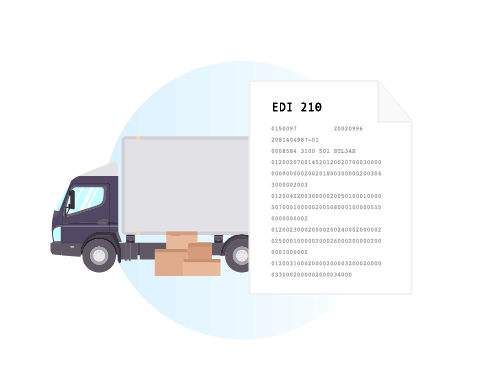How to Know if Your Logistics Solution is Up to Par

Logistics and supply chain challenges demand attention from organizations of all shapes and sizes. Logistics solutions are integral to the process of getting tangible products where they need to be – so whether you produce, manage, sell, supply, or distribute products, your bottom line benefits from streamlining and fortifying your approach to logistics.
Given the prevalence of supply chain needs, there are a range of available solutions for processing logistics data. To understand if your organization's solution is costing you time and money, it is helpful to first understand the kinds of logistics challenges that these solutions are designed to address.
What Challenges Does Logistics Processing Present?
Myriad challenges may arise when executing logistics processes, but the following stand out due to their combined ubiquity and difficulty:
Timely and Secure Data Exchange with Multiple Parties
Supply chain processes involve many different parties by nature. Different organizations and teams may use different communication protocols and have a range of requirements for processing and acknowledging receipts, encryption, and security protocols. Fulfilling each of these communication requirements using ad-hoc solutions can add tremendous friction to the onboarding process and makes maintenance and error correction a nightmare. Logistics solutions can rarely get by with only a narrow band of data transfer capabilities and a scattered approach to external communication.
Complex Data Formats like EDI
Standardized communication requires data standards like EDI (Electronic Data Interchange). Unfortunately, converting EDI data into other formats may pose a daunting technical challenge. Logistics providers inevitably face the challenge of EDI mapping, which allows for converting shipping, freight, and order data to integrate with disparate systems. The technical requirements involved in EDI processing constitute a significant hurdle for efficient logistics processes.
Availability, Reliability, and Non-Repudiation
Since logistics entails the exchange of critical data, logistics solutions must be highly available and reliable to ensure that no party involved fails to process your data. These requirements present a burden above and beyond mere communications, and involve issuing receipts, validating responses against requests, and other similar technical challenges. Without the ability to ensure that your logistics processing is always online and always fulfills its obligations, you may find yourself in the middle of contentious and expensive disputes with your trading partners.
Logistics Data Needs to Touch Different Elements of Your Data Ecosystem
Logistics processes involve access to internal resources like warehouse management systems, inventory listings, accounting books, and more. Moving logistics data through your data environment while also exchanging EDI documents with external parties requires your organization to implement a sophisticated data transformation and routing process. Without advanced data integration capabilities, you may be stuck with manual processes that slow down the supply chain and introduce the risk of costly human errors.
What Does a Modern Logistics Solution Look Like?
Given the challenges that logistics providers face, it's helpful to understand what it looks like when these challenges are addressed with an efficient and streamlined logistics solution. Modern logistics platforms typically include the following elements:
End-to-End Data Automation
The most important aspect of an efficient supply chain process is the removal of manual involvement. Automation significantly enhances the speed of data processing, minimizes the risk of error, and ensures that data flows to where it needs to be. This combination of timeliness and reliability is what characterizes a modern logistics solution.
Certified Security and Reliability
Whenever critical business data is transferred between external parties, safeguards must be in place to ensure that this data is not at risk. Organizations like the Drummond Group provide certifications that ensure the security and reliability of certified solutions. A modern logistics platform should boast Drummond Certification or similar credentials to prove that it provides these data safeguards and other essential features of secure communication protocols.
Streamlined EDI Translation and Mapping
Since EDI translation and mapping tend to present the most time-intensive challenge for onboarding new partners or adjusting existing configurations, modern logistics tools must put an emphasis on simplifying the process. A good supply chain processing solution ensures that organizations do not need dedicated EDI teams with specific technical training in order to exchange standardized data documents and integrate this data into the rest of their data ecosystem.
Universal Connectivity and Back-End Integration
Modern logistics solutions must be able to connect to many back-end systems to ensure that data flows from wherever it is generated to wherever it needs to go. Universal connectivity is integral to end-to-end data integration, and the ability to connect to any database, data lake, CRM, ERP system, accounting platform, etc., ensures that your organization never needs to manually intervene in your back-end systems to keep them up to date.
Error visibility and reporting
In any process as sophisticated as supply chain data movement, errors will occur sooner or later. Modern logistics solutions must provide visibility into these errors, including alerts and detailed logs, to ensure that problems can be identified and resolved before they become costly blockages in the data pipeline. Additionally, the ability to generate advanced reports and audits helps ensure that administrators can keep an eye on logistics data without needing to slog through specific transactions or connections.
How Does CData Make Logistics Easier?
CData provides a dedicated B2B integration tool designed to solve logistics and supply chain challenges. CData Arc and its cloud-hosted option, CData Arc Cloud provide a modern and streamlined approach to data integration tasks like those required in logistics.
CData Arc includes each of the major elements of a modern logistics solution:
- End-to-end automation
- Drummond certification
- No-code EDI mapping & translation
- Universal connectivity
- Enterprise reporting and error handling
CData Arc includes free fully-functional 30-day trials, so you can begin working with CData Arc immediately with guidance from our getting started guide.





